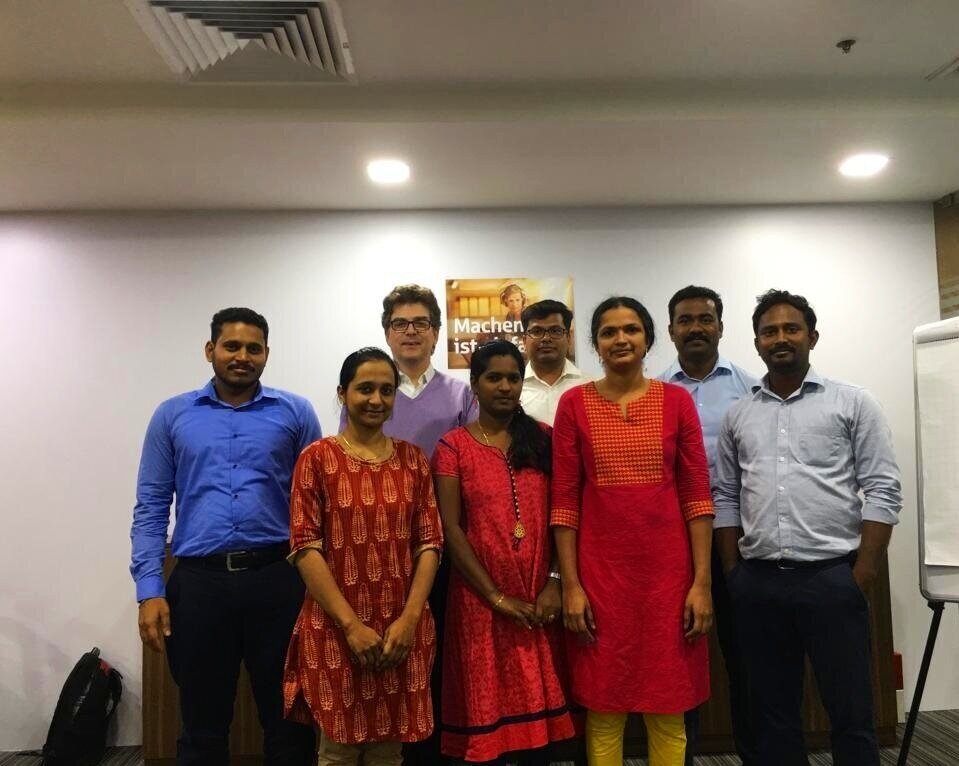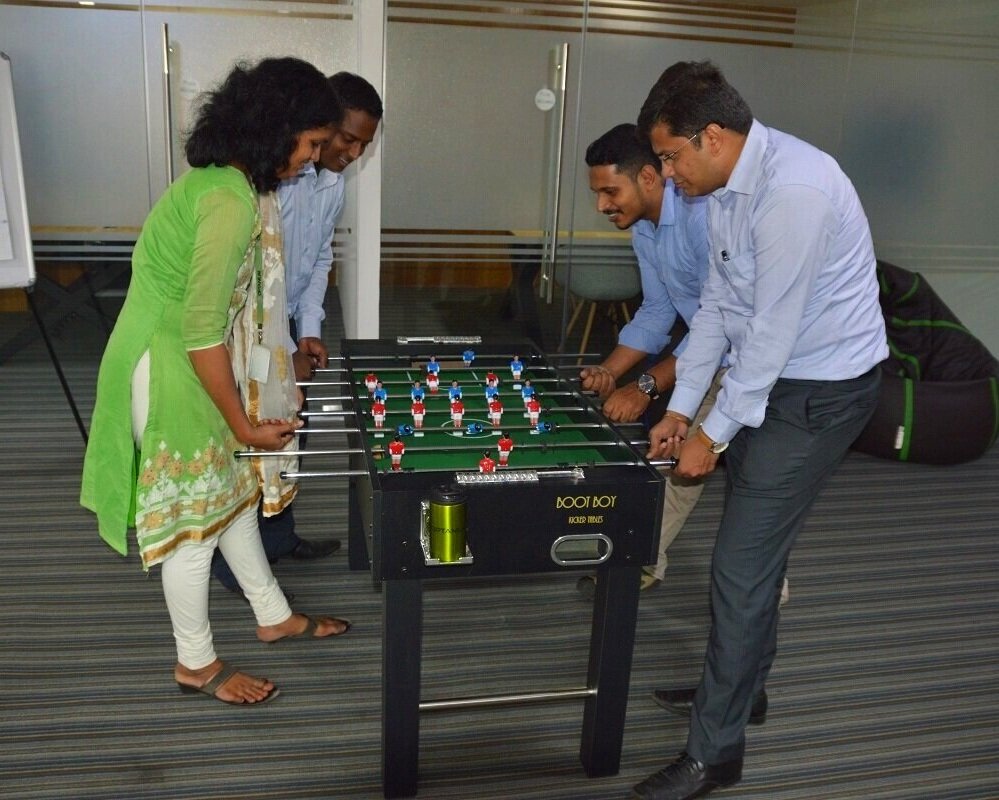German IT company Optanium Group has been operating in India for seven years and has not seen a single employee leave. And that is extraordinary in a country where most companies face high turnover rates. "We have found the right mix of an open European working atmosphere without micromanagement, but with the warm Indian family feeling," explains Marcel Nebel, Optanium Group's founder and managing director. "Our employees feel so free to express their opinions or start their own initiatives, that they almost can't find work anywhere else. And wouldn't want to either!" Nebel shares his 4 most important tips for a successful R&D team in India.
Director Marcel Nebel and some of his Indian team
Marcel Nebel - founder and director Optanium Group
1. Setting up a private limited in India takes time
Nebel had been working for an Indian consultancy for about seven years when he received an attractive offer from a German company. "They asked me to develop customer relationship management systems and other sales and marketing IT solutions for German SMEs. Due to my work experience, one thing was certain for me, I could not do this without a good team of Indian software developers. Despite working for an Indian company, I had no idea how to set up a private limited there." Step one became finding a suitable accountant to guide him through the process. "I was quite lucky, because I just started googling and found my accountant through that route. I did make it very clear during the first meeting that I wanted to start my private limited completely clean, so no kickbacks or other bribes to speed up the process. The accountant really appreciated that approach and that was also a confirmation for me that I was dealing with a good firm."
Establishing an entity can take a long time. Nebel's accountant had to be on top of things to keep the process from slowing down too much. "In total, the process took 13 months. My accountant had to make quite a few visits to make sure certain documents weren't left unsigned in the pile. Fortunately, Indian law lays down expiry periods for the approval of certain documents. If the government agency has not given a go before that date expires, the document is automatically considered approved. That has helped us a few times."
2. Involve your employees' families in the business
Fortunately, Nebel did not have to wait 13 months to get started. "As soon as we registered the private limited and received our PAN number, we could start immediately." Among his former colleagues, Nebel immediately found five software engineers who wanted to take on with him the challenge of setting up a German-Indian start-up. "We started building together a working environment in which there is a nice balance between German and Indian elements. By now our India team consists of 10 men and 10 women and we manage our people through a so-called competency model, which contains mainly European elements. We look at different skills such as software writing and presenting their ideas, but also at how they incorporate changes in the workplace. Every six months we do an evaluation and look for training opportunities for the competencies we want to strengthen. In doing so, there is also room for personal goals, which is very motivating."
A fun team outing is also organized every three to six months. "That's more of an Indian element," explains Nebel. "In India there is not such a hard division between work and private life and colleagues there see each other as a second family. We therefore regularly go out to dinner together or do something active like go to an adventure park to climb." The families of Optanium employees are also involved. "That's one of my most important tips for international entrepreneurs in India: involve your employees' families in the company. Invite them to company parties and certainly don't turn down an invitation to visit your employees' homes. It's an important part of building a good relationship of trust."
3. Draw a hard line, which creates clarity and trust
That bond of trust, according to Nebel, is one of the reasons Optanium has not had to deal with staff turnover. "From the very beginning, I started building an open and respectful atmosphere in the workplace. No micromanagement or hierarchical relationships, but everyone on the team is equal. In addition, our team in India is 50% female, a gender balance in the workplace is a spearhead for us." Only once has Nebel had to show someone the door because they were not functioning well within this setup. "This developer was working under a female supervisor and kept ignoring the orders she gave him. After we called him on it and he said he would do something about his attitude, nothing changed. I then had to fire him. The team really appreciated the hard line I took because it showed that everyone is equal in the company. There was never another incident like that after that either."
A game of foosball in the Indian office of the Optanium Group
To find personnel that fit within this work culture, Optanium therefore relies heavily on the network they have. "Everyone we have found through referrals so far fits in perfectly with our company. Although, of course, we don't limit ourselves by only inviting acquaintances of acquaintances to apply." Still, Nebel and his team in India have become a bit more cautious about applicants without recommendations. "We have experienced two crazy situations where the applicant misled us in the first job interviews we conducted via video call. One applicant had someone in the background doing the talking while he 'played along' on camera, another had someone else go through the entire interview process and appeared on his own on his first day. We have therefore had to introduce strict identification rules. For example, we now take screenshots during the video calls, which we compare with the person who comes to the personal interview and who appears in the office on the first day. In addition, we do an extensive passport check to make sure we have the right person in front of us."
4. Take the time to find your niche
For now, Optanium is still focusing primarily on the German market and not yet on India. "Our solutions are very individual and at the moment still too high-tech and too expensive for India," explains Nebel. "We don't have very many general products right now that any company could buy and implement, we build special systems based on the customer's requirements. For India, therefore, we should first find a good niche and then we can build, for example, a simplified customer relationship management system that can be widely and easily applied to Indian e-commerce platforms." Optanium's Indian team recently already saw an opportunity for building a specific Indian product. "We were working on special website visitor identification software for the European market. My team was eager to build a simple version of that for India, but we can't put such a product broadly into the Indian market at the moment. So for now we will continue to focus on the German market, but my team is always on the lookout for interesting opportunities in India."



